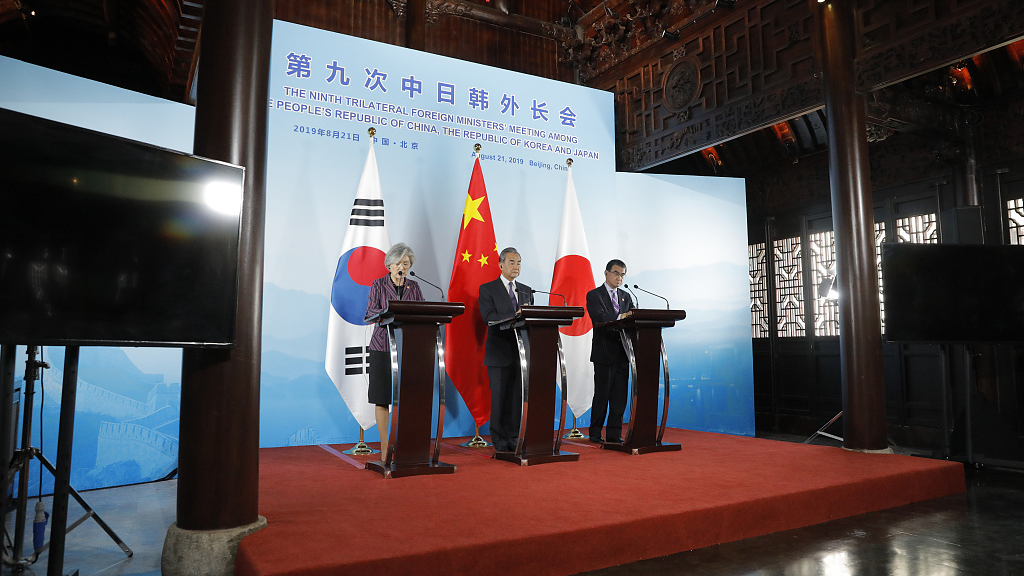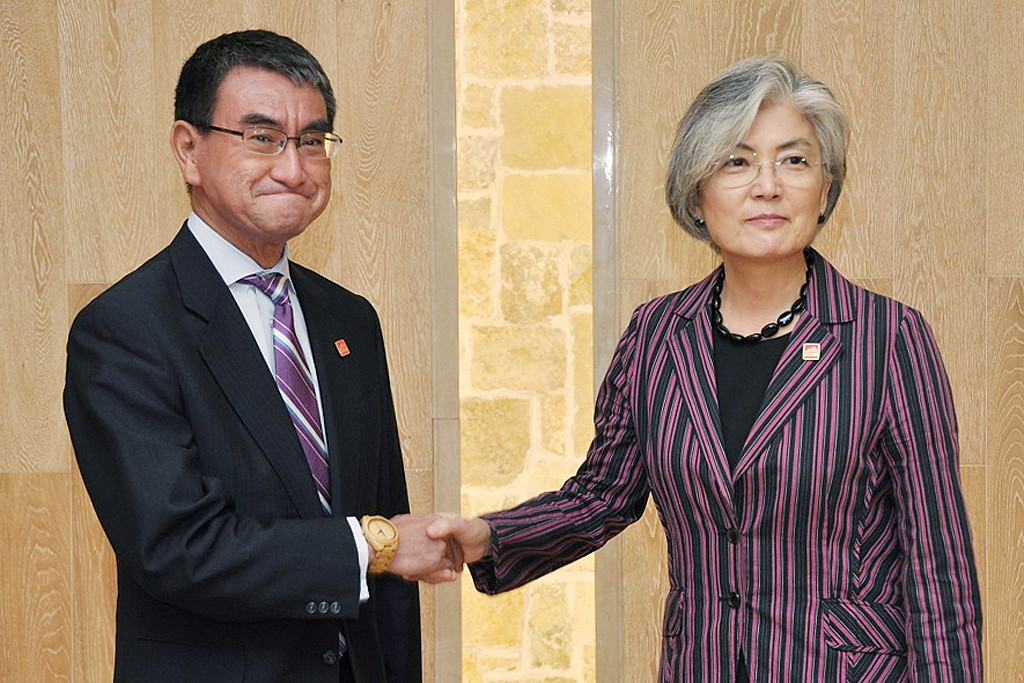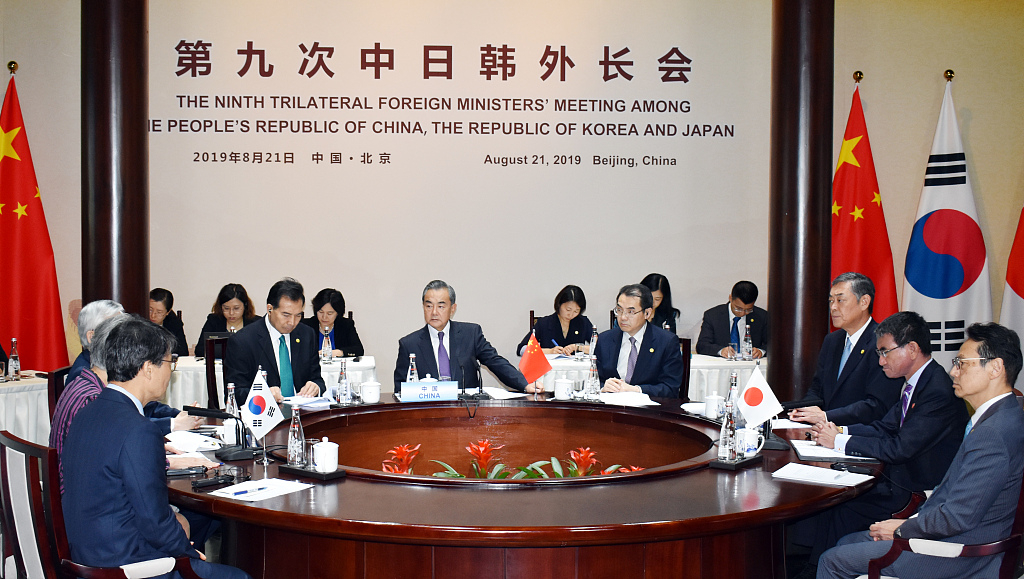

Editor's Note: Liu Rongrong is a research fellow at the China-Japan-South Korea Cooperation Research Center at Shandong University. The article reflects the author's opinions, and not necessarily the views of CGTN.
On August 21, the 9th China-Japan-South Korea Foreign Ministers' Meeting was held in Beijing. On this occasion, the three parties agreed to work together on the 8th meeting of leaders between China, Japan, and South Korea.
During the meeting, the Japanese and South Korean foreign ministers sat down in bilateral talks under heightened international attention due to the recent trade disputes between the two countries. However, their differences blocked them from reaching a breakthrough to mitigate the tensions. Japan insisted that South Korea should solve the forced labor claims, while South Korea maintained that Japan should remove export controls on South Korean exports and respect South Korea's court rulings on the matter of forced labor.

Japanese Foreign Minister Taro Kono (L) meets South Korean Foreign Minister Kang Kyung-wha (R) in Beijing suburb, China, on Aug 21, 2019. /VCG Photo
Why is it difficult for Japan and South Korea to reach a consensus? To begin with, both the Abe and the Moon administrations hold strong stances on historic issues and are unlikely to concede. Prime Minister Abe has strong right-leaning tendencies on historical matters, and the Japanese government has been ambivalent when it comes to its wartime history. Moon Jae-in, on the other hand, has a portfolio of being a human rights lawyer who supported democratization movements. And his administration is filled with people with similar progressive views on such historic and human rights issues such as comfort women and forced labor. They also oppose the previous administrations' compromise on these issues for the sake of maintaining a relationship between South Korea and Japan.
Second, nationalistic sentiments are running high in both countries. Antagonism and contempt toward each other have long been the mainstream public opinions in the two countries. A recent poll shows that only 12 percent of the South Koreans say they have a favorable view of Japan, while only 20 percent of the Japanese say they have a favorable view of South Korea. Rising nationalistic feelings have limited the room for diplomatic maneuvers between the two governments.
Third, Japan and South Korea do not see eye to eye on matters pertaining to the reshaping of regional order such as relationship with China, denuclearization of the Korean Peninsula, and the United States' adjustment of its policies towards East Asia. These differences are intensifying the competition between the two countries, leaving little common grounds to improve the relationship.
Therefore, it's unlikely that Japan and South Korea will reach a compromise in the short term. However, neither side is in favor of the situation worsening beyond control. South Korea has already decided to withdraw from the General Security of Military Information Agreement, or GSOMIA. And on August 28, Japan will officially enforce the policy of removing South Korea from the "white list." Both countries' actions in the coming weeks will determine the future path of Japan-South Korea relations. At present, both sides are projecting a sense of bringing the situation under control. Both sides have made it clear during the foreign ministers' meeting that they are still communicating through diplomatic channels.

Chinese Foreign Minister Wang Yi hosting Japanese and South Korean Foreign Ministers for a trilateral meeting in Beijing on August 21, 2019. /VCG Photo
The ongoing tensions in Japan-South Korea relations will have a detrimental impact on the political and economic cooperation between the two countries and beyond. First, Japan and South Korea are among each other's largest trading partners, with their industrial chains highly integrated. Ongoing trade rifts will cripple economic growth in both countries. Currently, bilateral tensions already have a spillover effect in politics, security, people-to-people and cultural exchanges, adding further uncertainty to the prospect of the relations.
Second, the deterioration of the Japan-South Korea relations is bringing new variations to the already complicated regional landscape. It is an impediment to the multilateral mechanisms in process including the Regional Comprehensive Economic Partnership, China-Japan-South Korea Free Trade Zone and the "China-Japan-South Korea+X" cooperation framework, thus jeopardizing regional peace and development. Third, as the world's third and twelfth largest economies, Japan and South Korea have seen their industrial chains highly integrated with the world economic system. In a world with anti-globalization force and unilateralism on the rampage, and with East Asia as the world's economic growth engine, trade disputes between these two countries are adding fuel to fire of the volatile world economy.
Chinese Foreign Minister Wang Yi's proclaimed China's continuous support for cooperation during the meeting, and China is taking the responsibility as a major country by creating opportunities for Japan and South Korea to sit down and talk. It is a positive sign toward regional cooperation. No East Asian countries hope to see the negative impact that a fraught Japan-South Korea relations brings onto cooperation within the region. It takes the joint endeavor of all countries to maintain the momentum of the economic cooperation and development in East Asia as well as of multilateralism and free trade.
(If you want to contribute and have specific expertise, please contact us at opinions@cgtn.com.)

Copyright © 2018 CGTN. Beijing ICP prepared NO.16065310-3
Copyright © 2018 CGTN. Beijing ICP prepared NO.16065310-3